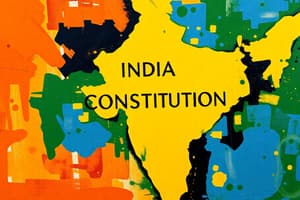Podcast
Questions and Answers
संविधान के किस भाग में मौखिक स्वतंत्रता, आवाज़ और अभिव्यक्ति, सभा, संघर्ष, आवास, और किसी भी पेशे या व्यवसाय का केवलिक प्रदान है?
संविधान के किस भाग में मौखिक स्वतंत्रता, आवाज़ और अभिव्यक्ति, सभा, संघर्ष, आवास, और किसी भी पेशे या व्यवसाय का केवलिक प्रदान है?
- पांचवा खंड
- चौथा खंड
- उसी भाग में संविधान की स्थिति
- प्रथम खंड (correct)
किस अनुच्छेद में मनवाधिकार के संरक्षण का प्रावधान है और जोरूरी है?
किस अनुच्छेद में मनवाधिकार के संरक्षण का प्रावधान है और जोरूरी है?
- पहला खंड
- दूसरा खंड (correct)
- तीसरा खंड
- पांचवा खंड
संविधान में कौन-कौन से मौलिक हक हैं?
संविधान में कौन-कौन से मौलिक हक हैं?
- समाजिक, आर्थिक, राजनीतिक
- समानता, स्वतंत्रता, धर्म की स्वतंत्रता, सांस्कृतिक, शैक्षिक हक (correct)
- न्याय, सुरक्षा, शिक्षा
- मानव शोषण उपरोक्तता का संरक्षित
किस अनुच्छेद में मनुष्य अत्याचार, मज़दूरी, और बाल मज़दूरी पर प्रतिबंध है?
किस अनुच्छेद में मनुष्य अत्याचार, मज़दूरी, और बाल मज़दूरी पर प्रतिबंध है?
संविधान संशोधन विधि के लिए निम्नलिखित विवरणों में से कौन सही है?
संविधान संशोधन विधि के लिए निम्नलिखित विवरणों में से कौन सही है?
किस अनुच्छेद में मानवाधिकारों के प्रकल्पन के लिए संविधानिक सुिमक प्रदान करता है?
किस अनुच्छेद में मानवाधिकारों के प्रकल्पन के लिए संविधानिक सुिमक प्रदान करता है?
संविधान संशोधन के लिए किस बहुलसंख्या की मांग होती है?
संविधान संशोधन के लिए किस बहुलसंख्या की मांग होती है?
संविधान संशोधन प्रक्रिया में क्या कहा गया है?
संविधान संशोधन प्रक्रिया में क्या कहा गया है?
मुख्यत: मुक्ति, सम्मान, मौलिक अधिकारों कि प्रमुख पहलू में क्या है?
मुख्यत: मुक्ति, सम्मान, मौलिक अधिकारों कि प्रमुख पहलू में क्या है?
संविधान संशोधन प्रक्रिया में सरकारी घोषणा की महत्वपूर्णता क्या है?
संविधान संशोधन प्रक्रिया में सरकारी घोषणा की महत्वपूर्णता क्या है?
Flashcards are hidden until you start studying
Study Notes
Indian Constitution: Amendments and Fundamental Rights
The Indian Constitution, enacted on January 26, 1950, is a comprehensive legal document that outlines the governance structure and fundamental principles of our country. As a living document, it has evolved through various amendments and acts to address the changing needs of a diverse and dynamic nation. In this article, we will examine the amendment procedures and the fundamental rights enshrined in the Indian Constitution, which serve as a safeguard for the people and a mechanism for necessary evolution.
Amendment Procedures
The Indian Constitution lays out a prescribed set of procedures for amendments to ensure that alterations are made judiciously and with the approval of the people. The amendment process is divided into two categories:
-
Constitutional Amendment Bill:
- Any bill seeking to amend the Constitution must be initiated in either the Lok Sabha (Lower House) or the Rajya Sabha (Upper House).
- The bill needs to be passed by at least two-thirds majority in both Houses.
- Following the approval of both Houses, the bill becomes an act only after it is assented to by the President.
-
Constitutional Amendment Bill for certain specific articles:
- To amend certain specific articles (Articles 368(2) and 13), the bill must be passed by a majority of not less than two-thirds of the total membership of each House and ratified by at least half of the state legislative assemblies.
Amendments to the Indian Constitution have been made throughout its history to address issues such as the extension of voting rights, adjusting state boundaries, and the addition of new rights.
Fundamental Rights
The Indian Constitution guarantees its citizens certain inalienable rights, known as fundamental rights, which are essential for the protection of individual freedoms and the preservation of democratic values. These rights are sanctioned in Part III of the Constitution.
-
Right to Equality (Article 14-18):
- This right guarantees equality before the law, protection against discrimination on grounds of religion, caste, sex, place of birth, or any of them, and equal protection of laws.
-
Right to Freedom (Article 19-22):
- This right encompasses the freedom of speech and expression, assembly, association, movement, residence, and the right to practice any profession or occupation.
-
Right against Exploitation (Article 23-24):
- This right prevents human exploitation, prohibits trafficking in human beings, forced labor, and child labor.
-
Right to Freedom of Religion (Article 25-28):
- This right protects the freedom of conscience and the right to freely profess, practice, or propagate religion.
-
Cultural and Educational Rights (Article 29-30):
- These rights guarantee protection of language and culture of minorities, as well as the right to establish and maintain educational institutions.
-
Right to Constitutional Remedies (Article 32):
- Provides a legal avenue for the enforcement of fundamental rights and protection from unlawful actions by the state.
The fundamental rights enshrined in the Indian Constitution provide a strong foundation for the protection of individual liberties and the promotion of a just and equitable society.
In conclusion, the Indian Constitution has evolved over the past seven decades through a series of amendments, ensuring that the document remains relevant and responsive to societal needs. The fundamental rights established in the Constitution serve to protect individual freedoms and promote a democratic, just, and equitable society. The amendment procedures, carefully prescribed in the Constitution, aim to uphold the balance between the necessity of change and the desire to maintain the integrity of the Constitution itself.
Studying That Suits You
Use AI to generate personalized quizzes and flashcards to suit your learning preferences.




